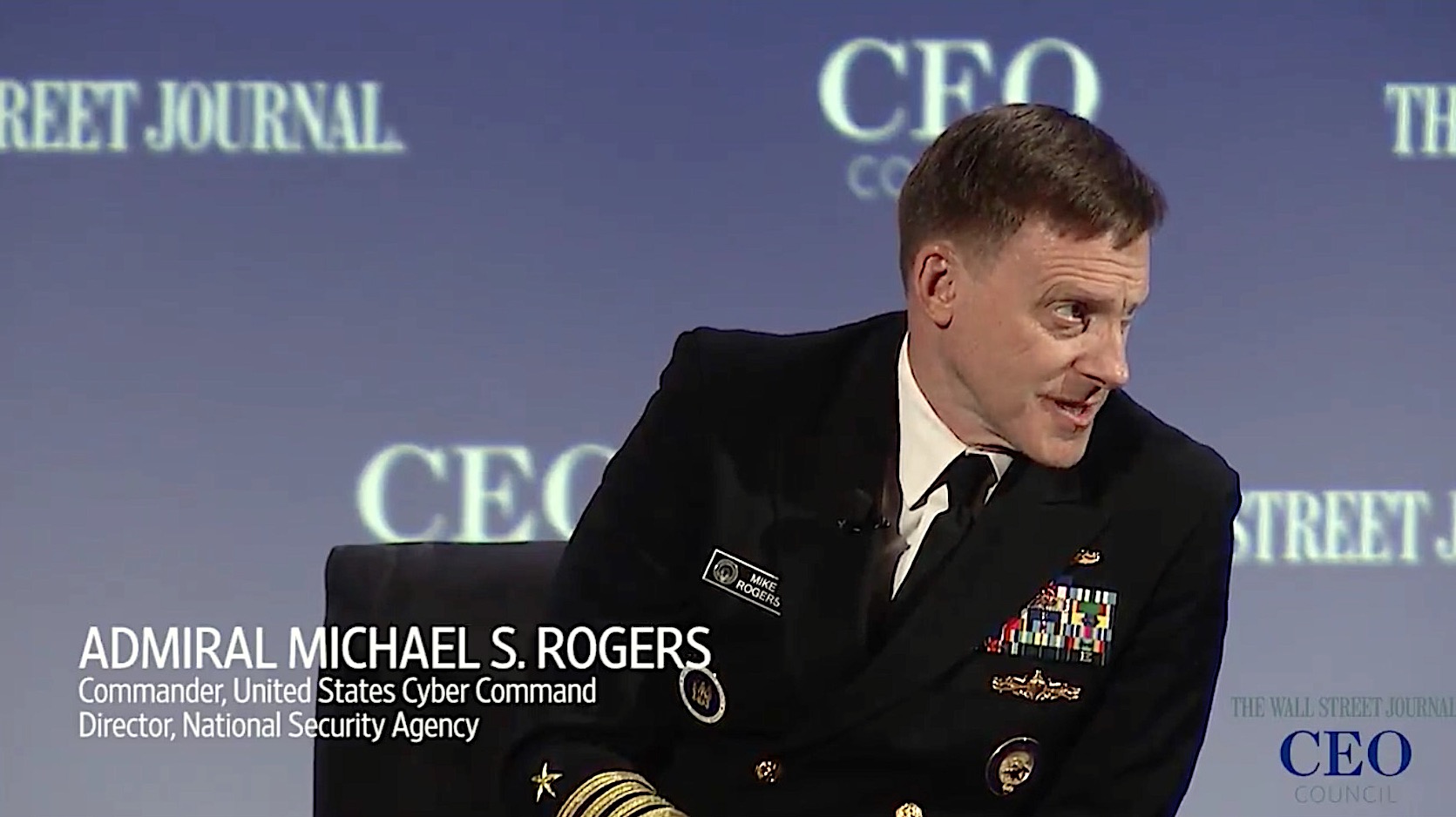NSA chief openly accuses 'nation state' of using WikiLeaks to tip presidential election


A free daily email with the biggest news stories of the day – and the best features from TheWeek.com
You are now subscribed
Your newsletter sign-up was successful
Adm. Michael Rogers, head of the National Security Agency and the U.S. Cyber Command, spoke at a Wall Street Journal forum on Tuesday, and much of the focus of his discussion with WSJ Deputy Editor-in-Chief Rebecca Blumenstein was about joining government and business to fight the scourge of cyber crime. The number of hackers is "so large and diverse" that it's difficult to identify the perpetrators, he said, but roughly two-thirds of them are criminals looking to earn money from stealing personal information, and the remaining third are state-sponsored hackers.
But Blumenstein also asked Rogers about WikiLeaks, and the slow and steady leak of emails stolen from Hillary Clinton campaign chairman John Podesta's gmail account. "There shouldn't be any doubts in anybody's mind: This was not something that was done casually, this was not something that was done by chance, this was not a target that was selected purely arbitrarily," Rogers said. "This was a conscious effort by a nation state to attempt to achieve a specific effect."
The "nation state" in question is almost certainly Russia, which the U.S. intelligence community blames for the political hacking and distribution of internal Democratic emails throughout the campaign, evidently aimed at harming Clinton and by extension helping Donald Trump. James Bell, who used to work for WikiLeaks, notes just how unusual Rogers' statement is:
The Week
Escape your echo chamber. Get the facts behind the news, plus analysis from multiple perspectives.

Sign up for The Week's Free Newsletters
From our morning news briefing to a weekly Good News Newsletter, get the best of The Week delivered directly to your inbox.
From our morning news briefing to a weekly Good News Newsletter, get the best of The Week delivered directly to your inbox.
By the time WikiLeaks started dribbling out the mostly mundane Podesta emails, any mention of Clinton and emails generated unflattering headlines. Russia and WikiLeaks were not responsible for Clinton using a private server as secretary of state, of course, nor did they force FBI Director James Comey to step into the campaign 11 days before Election Day, and again nine days after that. Clinton said the second intervention, where Comey said two days before the vote that there was nothing incriminating in the emails after all, damaged her campaign more than the earlier letter to Congress.
A free daily email with the biggest news stories of the day – and the best features from TheWeek.com
Peter has worked as a news and culture writer and editor at The Week since the site's launch in 2008. He covers politics, world affairs, religion and cultural currents. His journalism career began as a copy editor at a financial newswire and has included editorial positions at The New York Times Magazine, Facts on File, and Oregon State University.
-
 How the FCC’s ‘equal time’ rule works
How the FCC’s ‘equal time’ rule worksIn the Spotlight The law is at the heart of the Colbert-CBS conflict
-
 What is the endgame in the DHS shutdown?
What is the endgame in the DHS shutdown?Today’s Big Question Democrats want to rein in ICE’s immigration crackdown
-
 ‘Poor time management isn’t just an inconvenience’
‘Poor time management isn’t just an inconvenience’Instant Opinion Opinion, comment and editorials of the day
-
 Witkoff and Kushner tackle Ukraine, Iran in Geneva
Witkoff and Kushner tackle Ukraine, Iran in GenevaSpeed Read Steve Witkoff and Jared Kushner held negotiations aimed at securing a nuclear deal with Iran and an end to Russia’s war in Ukraine
-
 Pentagon spokesperson forced out as DHS’s resigns
Pentagon spokesperson forced out as DHS’s resignsSpeed Read Senior military adviser Col. David Butler was fired by Pete Hegseth and Homeland Security spokesperson Tricia McLaughlin is resigning
-
 Judge orders Washington slavery exhibit restored
Judge orders Washington slavery exhibit restoredSpeed Read The Trump administration took down displays about slavery at the President’s House Site in Philadelphia
-
 Hyatt chair joins growing list of Epstein files losers
Hyatt chair joins growing list of Epstein files losersSpeed Read Thomas Pritzker stepped down as executive chair of the Hyatt Hotels Corporation over his ties with Jeffrey Epstein and Ghislaine Maxwell
-
 Judge blocks Hegseth from punishing Kelly over video
Judge blocks Hegseth from punishing Kelly over videoSpeed Read Defense Secretary Pete Hegseth pushed for the senator to be demoted over a video in which he reminds military officials they should refuse illegal orders
-
 Trump’s EPA kills legal basis for federal climate policy
Trump’s EPA kills legal basis for federal climate policySpeed Read The government’s authority to regulate several planet-warming pollutants has been repealed
-
 House votes to end Trump’s Canada tariffs
House votes to end Trump’s Canada tariffsSpeed Read Six Republicans joined with Democrats to repeal the president’s tariffs
-
 Bondi, Democrats clash over Epstein in hearing
Bondi, Democrats clash over Epstein in hearingSpeed Read Attorney General Pam Bondi ignored survivors of convicted sex offender Jeffrey Epstein and demanded that Democrats apologize to Trump
